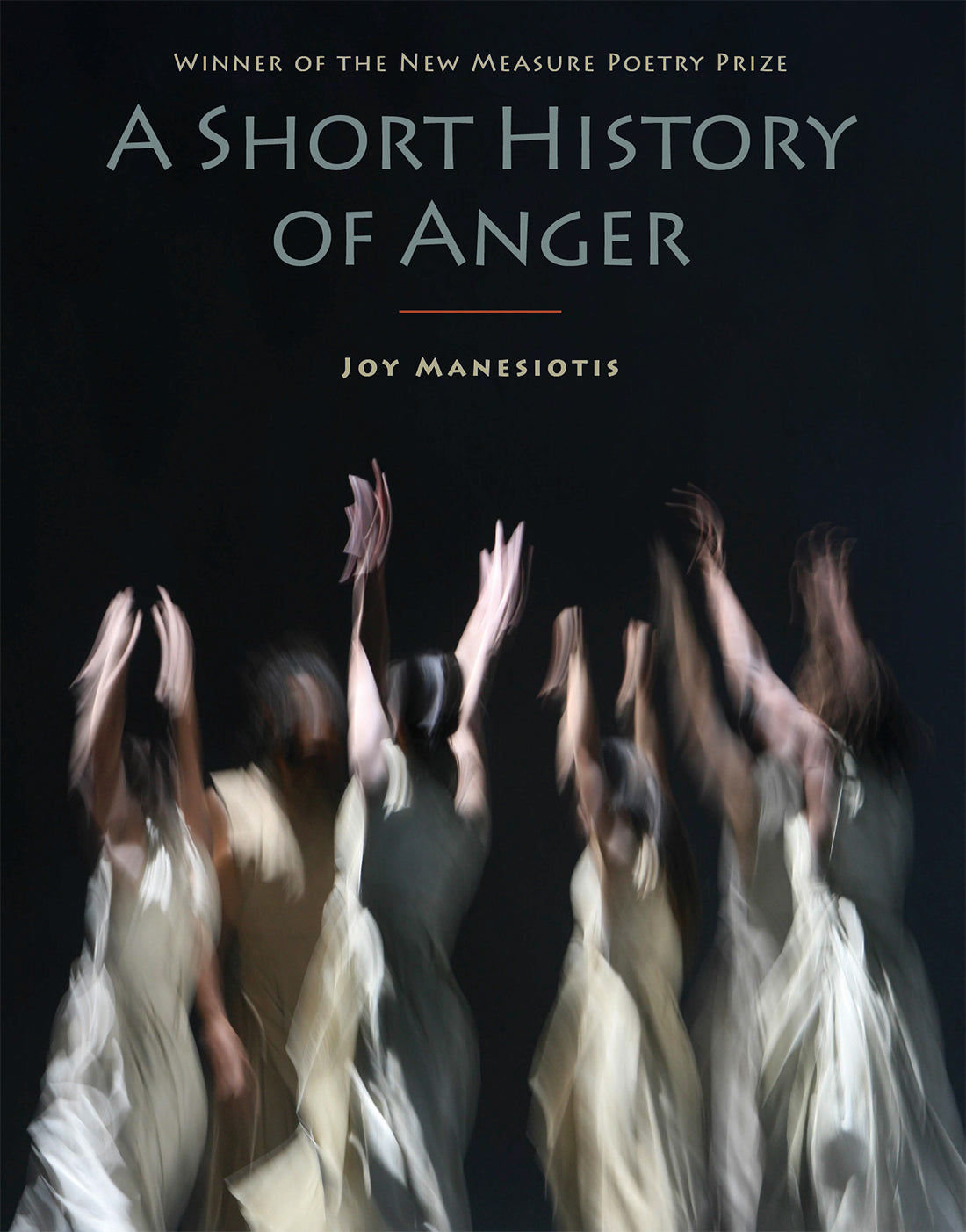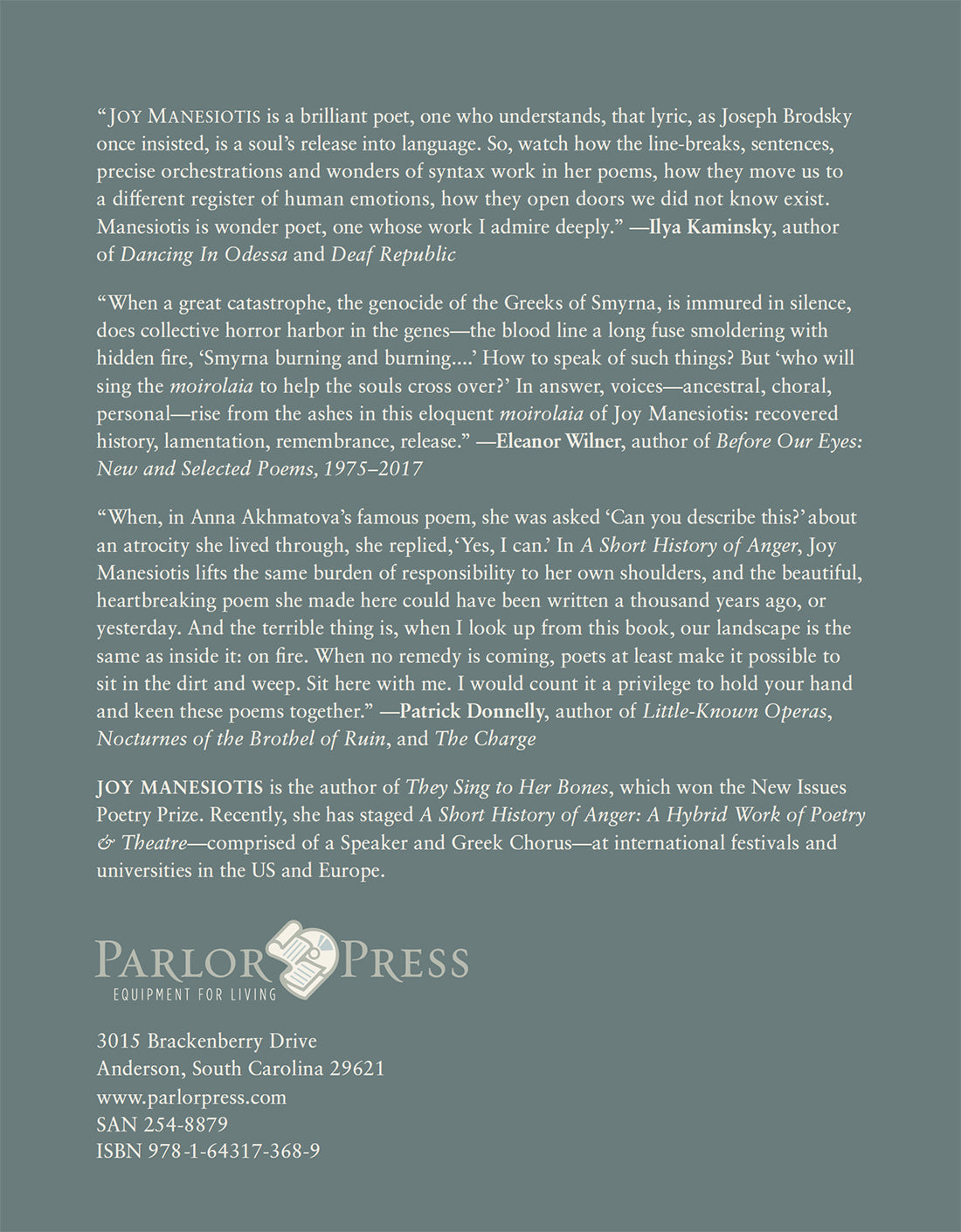Description
Joy Manesiotis
Winner of the New Measure Poetry Prize
Free Verse Editions
Edited by Jon Thompson
Information and Pricing
978-1-64317-367-2 (paperback, $20.95); 978-1-64317-368-9 (PDF, $9.99); 978-1-64317-369-6 (EPUB, $9.99). © 2023 by Parlor Press, 108 pages
Bookstores: Order by fax, mail, or phone. See our "Sales and Ordering Page" for details.
Interviews
- "Love & Genocide with Joy Manesiotis." Love & Its Discontents. 27 Jan. 2024. Video Interview.
- "Q&A with Joy Manesiotis," Book Q&As with Deborah Kalb, 20 March 2023.
What People Are Saying
Joy Manesiotis is a brilliant poet, one who understands, that lyric, as Joseph Brodsky once insisted, is a soul's release into language. So, watch how the line-breaks, sentences, precise orchestrations and wonders of syntax work in her poems, how they move us to a different register of human emotions, how they open doors we did not know exist. Manesiotis is wonder poet, one whose work I admire deeply. —Ilya Kaminsky, author of Dancing In Odessa and Deaf Republic
When, in Anna Akhmatova’s famous poem, she was asked “Can you describe this?” about an atrocity she lived through, she replied, “Yes, I can.” In A Short History of Anger, Joy Manesiotis lifts the same burden of responsibility to her own shoulders, and the beautiful, heartbreaking poem she made here could have been written a thousand years ago, or yesterday. The agony we learn about in these pages, vast as it was, was local to a certain time and place, but the suffering is universal. And the terrible thing is, when I look up from this book, our landscape is the same as inside it: on fire. When no remedy is coming, poets at least make it possible to sit in the dirt and weep. Sit here with me. I would count it a privilege to hold your hand and keen these poems together. —Patrick Donnelly, author of Little-Known Operas, Nocturnes of the Brothel of Ruin, and The Charge.
When a great catastrophe, the genocide of the Greeks of Smyrna, is immured in silence, does collective horror harbor in the genes--the blood line a long fuse smoldering with hidden fire, ”Smyrna burning and burning. . . .” How to speak of such things? But “who will sing the moirolaia to help the souls cross over?” In answer, voices––ancestral, choral, personal––rise from the ashes in this eloquent moirolaia of Joy Manesiotis: recovered history, lamentation, remembrance, release. —Eleanor Wilner, author of Before Our Eyes: New and Selected Poems, 1975–2017
Description
Both a book-length poetic hybrid and a live performance, A Short History of Anger takes as its source material the Destruction of Smyrna, the Turkish army’s genocide of Smyrna’s Greek citizens in 1922, and the resulting population exchange. Used as a blueprint for state-sponsored ethnic cleansing and forced migration, The Destruction of Smyrna is an event about which the world has remained strangely silent.
Before the massacre, Smyrna had been a rich, international city, a model of how people of disparate cultures and religions could coexist and build a vibrant culture. Today, that culture no longer exists. After the Destruction, all Orthodox Christians were moved to Greece and all Muslims to Turkey in a mandatory population exchange, creating a humanitarian nightmare of unprecedented scale. Many of the poet's family members were lost in The Destruction: a great uncle buried alive, another cousin dismembered; and those in her maternal grandparents' families who did survive forcibly exiled from their native Smyrna.
Governed by its musical, ritualistic construction and lament structure, A Short History of Anger attempts to excavate the legacy of genocide and displacement that has resonated from The Destruction. It is meant to be deeply affective, rather than narrative, and move in the way historical occurrences pass into the present and live through subsequent generations. A Short History of Anger combines prose and poetry, essay and verse, persona and chorus; built with many voices, layers and fractures, it employs a modern-day Greek Chorus.

About the Author
Joy Manesiotis is the author of They Sing to Her Bones, which won the New Issues Poetry Prize. Recently, she has staged A Short History of Anger: A Hybrid Work of Poetry & Theatre—comprised of a Speaker and Greek Chorus—at international festivals and universities in the US and Europe. Poems and essays have appeared widely in literary journals and anthologies, including The American Poetry Review, Poetry, Massachusetts Review, Virginia Quarterly Review, and Poetry International, as well as in translation, in the Romanian journal, Scrisul Romanesc. Manesiotis has received fellowships from New York Foundation for the Arts, the Graves Award, and Ragdale Foundation, and her poems were dropped over Nicosia, Cyprus, as part of Spring Poetry Rain, an international cultural event to help foster peace in the last divided city in Europe. She is the Edith R. White Distinguished Professor Emerita in Creative Writing, University of Redlands and serves on the editorial board of Airlie Press.


